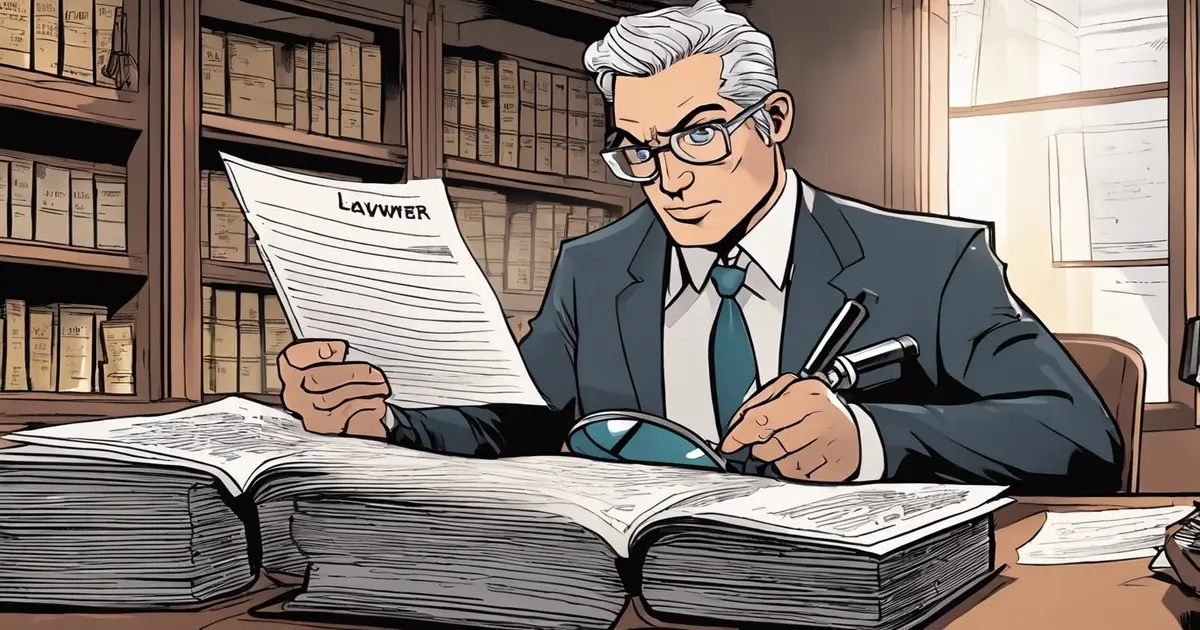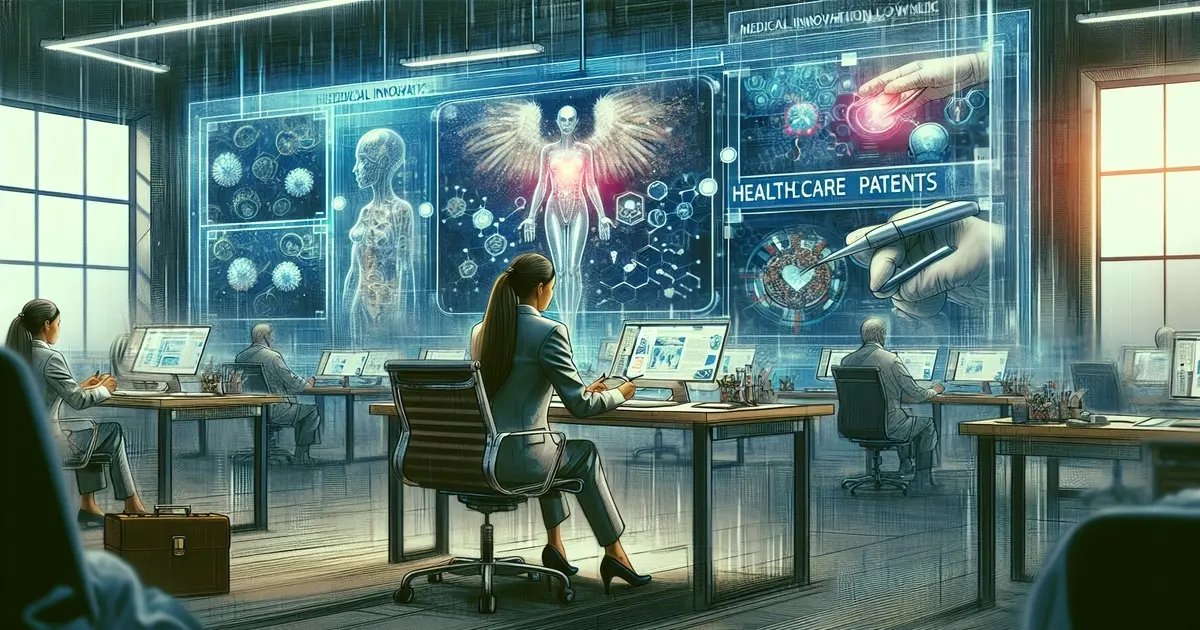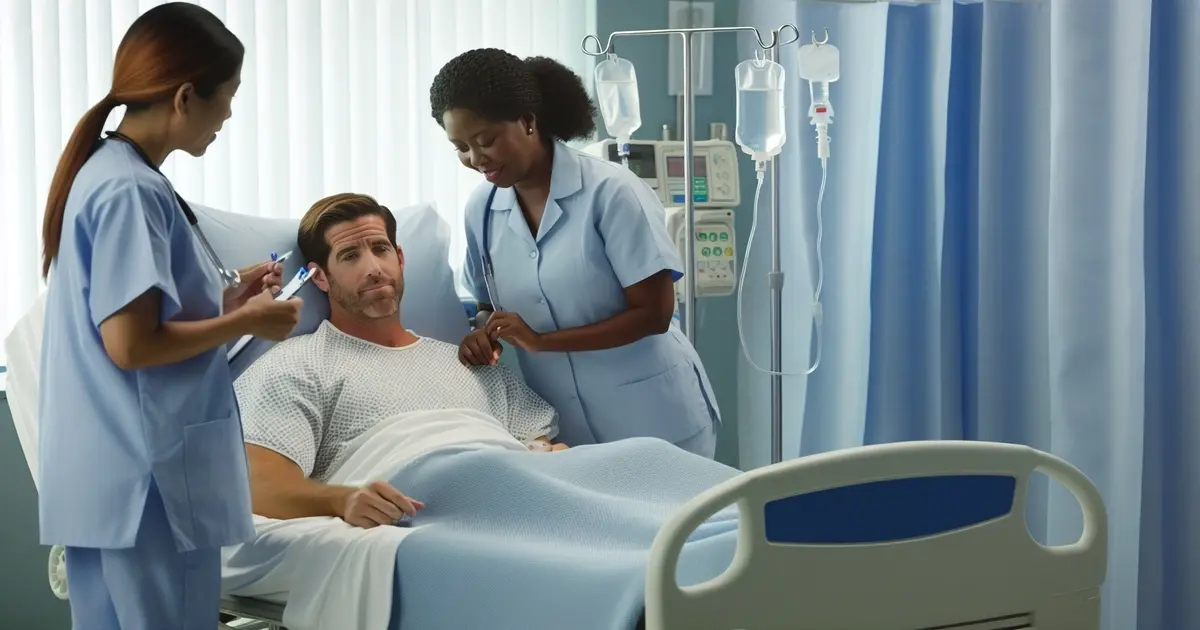Medical Malpractice Lawyer: A Guide to Winning Your Case
Navigating the complex waters of medical malpractice requires a skilled advocate by your side. The history of medical malpractice law stretches back centuries, evolving from simple negligence cases to intricate legal battles involving cutting-edge medical technology and procedures. This rich historical context underscores the importance of selecting a medical malpractice lawyer with profound legal insight and a deep understanding of medical practices and standards.
With stakes higher than ever in today's healthcare landscape, having an expert who can dissect complicated medical records, understand the nuances of healthcare law, and passionately represent your interests is crucial. Finding the right lawyer could mean the difference between getting lost in the system and achieving justice, whether facing a misdiagnosis, surgical error, or any other form of medical negligence.
Table Of Contents
Defining Medical Malpractice
Legal Definition
Medical malpractice occurs when healthcare providers cause harm through negligent acts. These acts deviate from the professional standards expected in the medical community. It's a serious accusation that can have profound implications for providers and patients.
Negligence can stem from various errors. These include diagnosis, treatment, aftercare, or general health management mistakes. For an act to be considered malpractice, it must deviate from what is accepted as standard care within the medical profession.
Standard of Care
The standard of care is a critical concept in medical malpractice cases. It refers to the level and type of care a reasonably competent healthcare provider with a similar background would have provided under similar circumstances. This standard is not static; it evolves with advancements in medicine and changes in health guidelines.
Proving a deviation from this standard is essential for a successful malpractice claim. Plaintiffs must show that their healthcare provider’s actions were not aligned with what other professionals would consider acceptable treatment.
Proving Negligence
To establish medical malpractice, three elements must be present: proof of deviation from standard care, direct injury to the patient caused by this negligence, and significant damages resulting from the injury. Without these components, a claim cannot proceed.
Injury without proven negligence or negligence that does not result in harm does not constitute malpractice. This distinction is vital as it separates genuine malpractice cases from unfortunate outcomes that are not the result of provider error.
Distinguishing Outcomes
Not every adverse medical outcome is due to malpractice. Medicine is inherently risky, and some treatments do not guarantee success despite being performed correctly and with due diligence. Distinguishing between actual medical malpractice and unfortunate but non-negligent outcomes is crucial for justice to be served accurately.
Patients who suffer harm due to genuine negligence deserve compensation for their injuries and additional suffering. However, attributing unavoidable complications to malpractice without evidence of negligence undermines trust in healthcare systems and professionals.
Common Examples of Malpractice
Misdiagnosis
Misdiagnosis stands as a frequent example of medical malpractice. It occurs when a healthcare professional inaccurately identifies a patient's condition, leading to incorrect treatment. This error can delay the correct treatment, worsening the patient's health.
Many cases involve conditions with similar symptoms to others, such as heart attacks being mistaken for indigestion. The impact on the patient can be severe, including prolonged illness or even death. Documentation is crucial in proving misdiagnosis, highlighting the difference between what was observed and the actual condition.
Surgical Errors
Surgical errors are among the most alarming forms of medical malpractice. They range from operating on the wrong body part to leaving surgical instruments inside the patient's body. These mistakes not only cause immediate harm but also lead to long-term complications and additional surgeries.
The consequences for patients are often life-changing, involving significant physical and emotional distress. Establishing these cases typically requires expert testimony to demonstrate how the standard of care was breached during surgery.
Medication Mistakes
Medication mistakes cover a broad spectrum of errors, including prescribing the wrong medication or dosage and administering a drug to which the patient is allergic. Such errors can result in adverse reactions, ineffective treatment, or overdose.
Patients may suffer from prolonged illness or develop new health issues as a result of medication mistakes. Proving these cases involves showing how the prescribed medication deviated from what would have been appropriate under the circumstances.
Birth Injuries
Birth injuries represent another critical area of medical malpractice. These injuries can occur due to negligent prenatal care or mistakes made during childbirth. Common examples include failing to monitor fetal distress or improperly using delivery tools.
These errors can have devastating effects on both newborns and their mothers, leading to lifelong disabilities or fatalities in severe cases. Documentation of prenatal visits and childbirth procedures is vital in establishing negligence.

Identifying Your Malpractice Case
Unexpected Complications
If you experience unexpected complications after medical treatment, it might be a sign of malpractice. These complications can range from infections to worsening conditions. They often suggest that something went wrong during your care.
It's crucial to listen to your body. If you feel worse instead of better, take note. This is especially true if the outcome drastically differs from what was promised. Such discrepancies might indicate a misstep in practice.
Lack of Improvement
A lack of improvement following treatment or surgery could signal a problem. This is particularly relevant if you received a delayed diagnosis. Delay in identifying an illness can lead to incorrect or late treatment, harming your health further.
Keep track of how you're feeling post-treatment. If no sign of recovery or symptoms persists, this could indicate negligence. In these instances, the expertise of a medical malpractice lawyer becomes invaluable.
Medical Records
Your medical records are vital in supporting any claim of malpractice. They provide a detailed account of your diagnosis, treatment, and follow-up care. Requesting copies of all your medical documents as soon as possible is essential.
Reviewing these records can help identify inconsistencies or errors in your care. Look for deviations from standard practices that could have led to adverse outcomes. Remember, thorough documentation strengthens your case significantly.
Second Opinions
Seeking a second opinion is not just about getting another perspective on your diagnosis or treatment plan; it's also a critical step in confirming or disputing the quality of care you received initially.
A new set of eyes can uncover mistakes during the initial diagnosis or treatment process. If the second opinion differs significantly from the first, it might indicate malpractice occurred.
Immediate Steps
If you suspect malpractice, immediate action is essential. Start by documenting everything related to your case—symptoms, treatments received, and communications with healthcare providers.
Next, consult with a medical malpractice lawyer as soon as possible. They can offer guidance on whether you have a viable case and what steps to take next.
Proving Your Malpractice Claim
Duty Established
After identifying your malpractice case, the next step involves proving it. The first element to establish is duty. This means showing that the health care provider owed you a standard of medical care.
Doctors, nurses, and hospitals must provide care that meets professional standards. Your medical records serve as critical evidence here. They detail your treatment and help demonstrate the care provider's responsibility towards you.
Breach of Duty
The second element is proving a breach of duty occurred. This involves showing that the physician or nurse failed to meet the standard of care expected in their profession.
Medical expert witnesses are crucial at this stage. They can explain what the standard of care should have been and how the health care provider fell short. Their testimony helps establish that a negligent act occurred, directly linking it to the breach.
Causation Link
Causation is perhaps the most challenging part of a medical negligence claim. You must prove that the breach directly caused harm or serious injuries.
This often requires detailed analysis and sometimes further tests to draw a clear line between negligent acts and injury. For example, in cases of birth injury, experts must demonstrate how specific actions during delivery led to harm.
Damages Suffered
Finally, demonstrating damages involves quantifying the harm suffered due to medical negligence. This can include physical pain, emotional distress, additional medical bills, and lost wages.
Victims need comprehensive documentation showing how the incident impacted their lives. This underscores immediate and long-term repercussions on their well-being and financial stability.
Expert Witnesses
Medical expert witnesses play a pivotal role throughout these stages. They clarify complex medical procedures and highlight where care deviates from acceptable standards.
Their insights into vicarious liability can strengthen your complaint against larger entities like hospitals or clinics beyond individual physicians or nurses.
Understanding Damages Awarded
Compensatory Damages
Compensatory damages are the financial compensation awarded to plaintiffs in medical malpractice cases. They cover two main areas: economic and non-economic damages.
Economic damages reimburse actual losses, including medical expenses and lost wages. Plaintiffs provide bills and employment records to calculate these figures accurately, ensuring victims receive fair compensation for their financial setbacks.
Non-economic damages, on the other hand, cover pain and suffering. They compensate for the emotional distress caused by the malpractice. Calculating these is more subjective. It involves assessing the severity of the plaintiff’s suffering and its impact on their life.
Punitive Damages
Punitive damages serve a different purpose. They aim to punish the defendant for particularly harmful behavior. Not all cases qualify for punitive damages. There must be evidence of malicious intent or gross negligence.
These awards send a strong message to healthcare professionals, emphasizing the importance of adhering to standards of care. However, punitive damages are less common in medical malpractice suits than compensatory ones.
Damage Caps
Some jurisdictions impose caps on damages in malpractice cases. These limits often apply to non-economic damages like pain and suffering.
Caps vary widely between states. Some argue they keep insurance premiums manageable for healthcare providers, while critics believe they unjustly limit compensation for those severely affected by malpractice.
Understanding whether caps apply is crucial when estimating potential awards in a lawsuit.
The Role of Malpractice Lawyers
Evidence Collection
Medical malpractice lawyers are crucial in gathering evidence to build a strong case. They meticulously review medical records, interview witnesses, and consult with experts. This evidence is vital for demonstrating negligence.
They ensure that every detail is accounted for, no matter how small. Their expertise allows them to identify discrepancies or omissions in medical documentation. This thoroughness can make a significant difference in the outcome of a case.
Expert Consultation
Consulting with medical experts is another critical responsibility of malpractice lawyers. These professionals provide insights into where the standard of care was not met, and their testimonies are often pivotal in proving negligence.
Malpractice lawyers have networks of reputable experts across various specialties. This access is crucial for obtaining objective opinions on complex medical issues. It strengthens the victim's claim, showcasing the lawyer's commitment to justice.
Settlement Negotiation
Negotiating settlements is where malpractice lawyers genuinely shine. They leverage their knowledge and evidence collected to secure fair compensation for victims. This process involves discussions with healthcare providers and insurance companies.
The goal is always to reach an agreement covering all economic and non-economic damages. Skilled negotiation can result in settlements that avoid lengthy court battles. It demonstrates the lawyer’s dedication to their client's well-being.
Legal Navigation
Navigating the legal and medical aspects of malpractice cases is complex. Malpractice lawyers guide victims through this daunting process with expertise and compassion. They understand the intricacies of laws governing medical practice and patient rights.
Their ability to simplify these complexities for clients is invaluable. It ensures victims are informed about their case every step of the way. This guidance provides peace of mind during challenging times.
Experience Importance
The importance of a lawyer’s experience in similar cases cannot be overstated. Experienced malpractice lawyers bring knowledge from previous successes (and failures). They know what strategies work best in court or negotiations.
This experience translates into more effective representation and better outcomes for clients. It underscores the necessity of choosing a lawyer specializing in medical malpractice claims.
Selecting the Right Legal Expert
Experience Matters
When looking for a medical malpractice lawyer, experience is critical. You want someone who has spent years navigating the complexities of law and health. This expertise ensures they understand the particular facts of your case promptly.
They should have a successful history of handling similar cases. Their past victories ensure they can help you achieve the best possible outcome. Ask about their experience directly related to medical malpractice to gauge their suitability.
Team Strength
A strong legal team is crucial for handling your case effectively. The right lawyer will have a dedicated staff or team members who are experts in their fields. This includes paralegals, administrative staff, and possibly other lawyers.
Look for a firm where every staff member works together seamlessly. They should communicate with you promptly and keep you informed throughout the process. A cohesive team means better support and a more robust representation of your case.
Medical Expertise
Your lawyer's access to medical experts is vital. These expert witnesses can make or break your case by providing critical insights into what went wrong during your medical treatment.
Check if the lawyer has a network of reputable medical professionals they work with regularly. This relationship between law and medicine can significantly strengthen your position by offering detailed analyses of your health situation.
Compatibility Check
Before making your choice, conduct interviews with potential lawyers. It’s essential that you feel comfortable with them on a personal level. The right lawyer will listen to you, understand your situation, and genuinely commit to helping you rest easy, knowing they are fighting for your cause.
Discuss how they plan to handle your case and ensure their approach aligns with what you seek. A good working relationship is foundational to navigating through this challenging time together.

Financing Your Legal Battle
Contingency Fees
Contingency fees revolutionize how victims approach legal battles. This arrangement means clients pay only if they win their case. It aligns the lawyer's interests with the client's, ensuring dedicated representation without upfront costs. Typically, lawyers take a percentage of the settlement, varying from case to case.
Clients find this appealing as it removes financial barriers to seeking justice. However, understanding the percentage and agreement details is crucial. It determines how much of the settlement goes towards legal fees versus what the victim retains for medical expenses and rebuilding their life.
Additional Costs
Beyond lawyer fees, other expenses emerge in malpractice cases. These include filing fees, costs for obtaining medical records, and expert witness fees. Each plays a vital role in building a solid case but adds to the financial burden.
Filing fees are mandatory for court processing. Obtaining medical records is essential for proving negligence or failure in health care provision. Expert witnesses lend credibility and expertise, often tipping the scales in favor of the claimant. Clients should anticipate these costs early on.
Managing Expenses
Effectively managing out-of-pocket expenses is key during legal proceedings. First, maintain detailed records of all related costs, including lost wages due to time off work. This documentation can support claims for compensation beyond just medical bills.
Negotiating payment terms with your legal team can also help manage costs. Some lawyers might defer specific fees until after a settlement is reached. Exploring options like legal aid or pro bono services can offer relief in particular circumstances.
Benefits of Professional Representation
Legal Expertise
Hiring a medical malpractice lawyer brings invaluable legal expertise to your case. They understand the complex laws surrounding medical negligence. This knowledge is crucial for navigating the legal system effectively.
They prepare a strong case by gathering evidence and expert testimonies. Their experience allows them to anticipate and counteract the defense's strategies. With their help, you avoid common pitfalls that could weaken your claim.
Negotiation Skills
A skilled lawyer excels in negotiating with insurance companies. They know how these entities operate and what tactics they use to minimize payouts. Your attorney will fight for a fair settlement on your behalf.
Insurance providers often offer low initial settlements to unrepresented claimants. A lawyer ensures you're not undervalued or overlooked. They leverage their negotiation skills to secure better compensation for your losses.
Higher Compensation
One of the most compelling reasons to hire a professional is the increased likelihood of receiving higher compensation. Statistics show that claimants with legal representation tend to secure more substantial settlements or awards than those who go it alone.
This isn't just about numbers; it's about justice and ensuring you're adequately compensated for your losses. These include medical expenses, lost wages, and pain and suffering. A qualified attorney knows how to quantify these damages accurately.
Emotional Support
Dealing with a medical malpractice case can be emotionally draining. Victims often feel overwhelmed by the legal process on top of their physical and emotional recovery.
A compassionate lawyer provides much-needed support during this challenging time. They handle the legal burdens, allowing you to focus on healing. Knowing someone is fighting for your rights can be incredibly reassuring.
Logistical Assistance
Beyond emotional support, a malpractice lawyer offers logistical help throughout your case. They manage deadlines, file paperwork, and communicate with all parties involved.
This assistance ensures your case progresses smoothly without unnecessary delays or errors. It also means you have more time and energy to devote to your recovery rather than worrying about legal details.
Closing Thoughts
Navigating the complex world of medical malpractice can feel overwhelming, but understanding your rights and the steps to take makes a significant difference. From identifying malpractice cases to securing professional representation, each phase is crucial in ensuring justice and compensation for your suffering. A skilled medical malpractice lawyer becomes an advocate and a vital ally in this challenging journey. They bring expertise, support, and the strategic know-how necessary to navigate these turbulent waters successfully.
Remember, the choice of legal expert could make or break your case. Opting for a seasoned malpractice lawyer ensures you can face insurance companies and courtroom battles head-on. Don't let uncertainty deter you from seeking what you deserve. Contact a trusted medical malpractice lawyer today and start your path toward healing and restitution.
Frequently Asked Questions
What is considered medical malpractice?
Medical malpractice occurs when a healthcare professional deviates from the standard of care and harms a patient. This includes errors in diagnosis, treatment, aftercare, or health management.
How do I know if I have a medical malpractice case?
Identify if there was a violation of the standard of care, direct causation between this breach and your injury, and significant damages. Consulting with a malpractice lawyer can clarify your situation.
What types of damages can be awarded in a malpractice lawsuit?
Damages typically include compensation for medical bills, lost wages, pain and suffering, and sometimes punitive damages to punish egregious conduct.
Why should I hire a medical malpractice lawyer?
A specialized lawyer understands the complexities of medical cases, can navigate the legal system effectively, and significantly increases your chances of receiving fair compensation.
How do I choose the right medical malpractice lawyer?
Look for experience in similar cases, successful track records, strong communication skills, and someone who makes you feel comfortable and confident in your abilities.
Can I afford to hire a medical malpractice attorney?
Many lawyers work on a contingency fee basis, meaning they only get paid if you win your case. Discuss payment structures during initial consultations.
Related Post
Mesothelioma Lawyer Guide
Navigating through the legal maze of mesothelioma cases, a form of asbestos litigation, requires a skilled lawyer who understands the disease's complexity and has a track record of securing justice for victims.
Read MoreMedical Innovation Lawyer
Have you ever wondered how groundbreaking medical technologies from innovative healthcare and health technology companies navigate the complex web of legalities with sophisticated health law technology to reach the market as a healthcare innovator?
Read MoreBioethics Lawyer
In the ever-evolving landscape of medicine and technology, where groundbreaking advancements can sometimes blur the lines of ethical boundaries, bioethics lawyers stand as crucial navigators.
Read MoreHealth Insurance Lawyer
Over 8% of Americans find themselves wrestling with health insurance claims and fraud issues each year, revealing a complex system of laws and benefits that often feels like it's designed to be confusing.
Read MoreHealth Care Compliance Lawyer
Have you ever wondered who, among health lawyers and attorneys, ensures medical practices and healthcare providers, including physicians, operate within the complex web of laws and regulations?
Read MoreCar Accident Lawyer
Navigating the aftermath of a car accident may feel like trying to find your way through a maze without a map, especially if pedestrians are involved and you're on your way to work from the side street.
Read More






